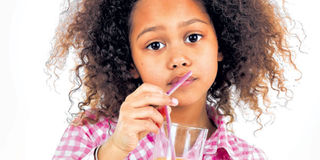Home remedies for chicken pox

Ensure that your child takes lots of fluid to prevent dehydration. PHOTO | AFP
What you need to know:
- Most healthy children who develop chicken pox simply need home treatment to ease some of the symptoms, such as fever and itching.
- Eating can be difficult for a child with chicken pox because blisters develop inside the mouth and throat as well.
Chicken pox is a highly infectious viral disease whose symptoms can cause a lot of discomfort, especially in young children.
Just like any other viral disease, chicken pox has no cure. The virus normally clears up on its own without treatment. Most children develop chicken pox at a very young age and, thankfully, it is normally a mild illness.
Most healthy children who develop chicken pox simply need home treatment to ease some of the symptoms, such as fever and itching. The following are some of the symptoms common with chicken pox and advice on what to do to help your sick child:
A rash that can be very itchy: Scratching the blisters can cause skin infection and scars, once blisters heal.
- To prevent this, keep your child’s fingernails short and clean.
- Put gloves or socks over your child’s hands, particularly when asleep, to prevent him scratching.
- If his skin is very sore or itchy, apply calamine lotion, which has a cooling and soothing effect that relieves itching.
- Dress him in smooth, loose-fitting clothes and avoid overdressing to prevent sweating. Sweaty skin is more likely to cause irritation and discomfort.
- Sprinkle finely ground oatmeal into warm bathing water to help soothe the itchy skin. Oatmeal makes the bath slippery, so help him in and out of the bath. Let him remain in the bath for about 15-20 minutes, then pat him dry using a dry clean towel. Adding a cup of baking soda to bath water can also help in relieving itching.
Fever is almost inevitable with chicken pox: If he develops a fever, take off extra clothing.
- If he is two months or older, give an analgesic such as paracetamol or ibuprofen to help bring down the temperature and also relieve aches and pains.
Always avoid giving aspirin since it is associated with causing Reye syndrome, which can cause brain damage.
Give lots of fluid to prevent dehydration: Severe dehydration is dangerous. If your child is still breastfeeding, continue breastfeeding and, if possible, increase the frequency of nursing. If he is on formula or already weaning, offer him lots of water.
Other fluids include light porridge, vegetable soup, diluted fresh fruit juices, or diluted milk.
Eating can be difficult for a child with chicken pox because blisters develop inside the mouth and throat as well. A bland diet (foods that do not cause irritation) is recommended.
- Avoid giving spicy, salty, and crunchy foods, since these can make the blisters to burst, worsening the pain.
- Also, do not give citrus fruits since they contain a high acid content which can intensify the pain of the blisters.
- Since a child with chicken pox has a very poor appetite, offer small and frequent meals. It helps to allow him to eat whatever he finds appealing as long as it is in reasonable amounts.




